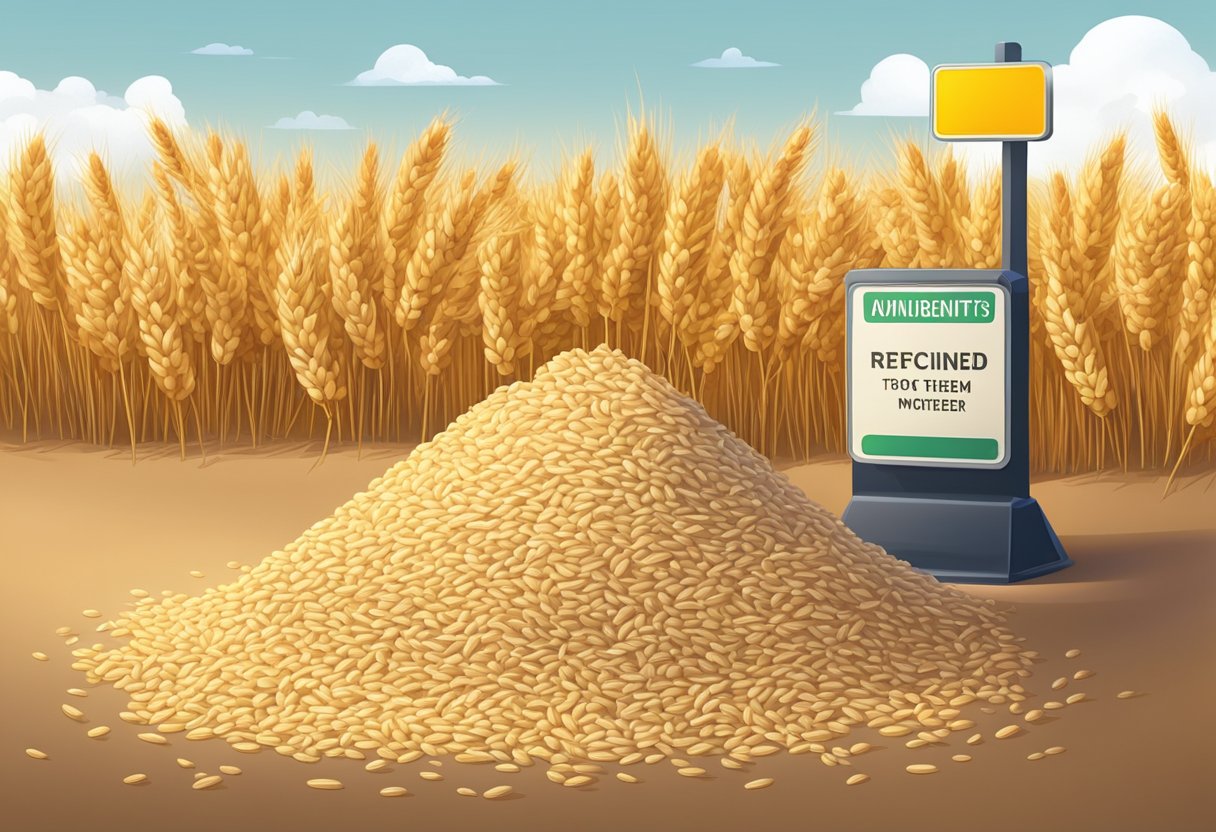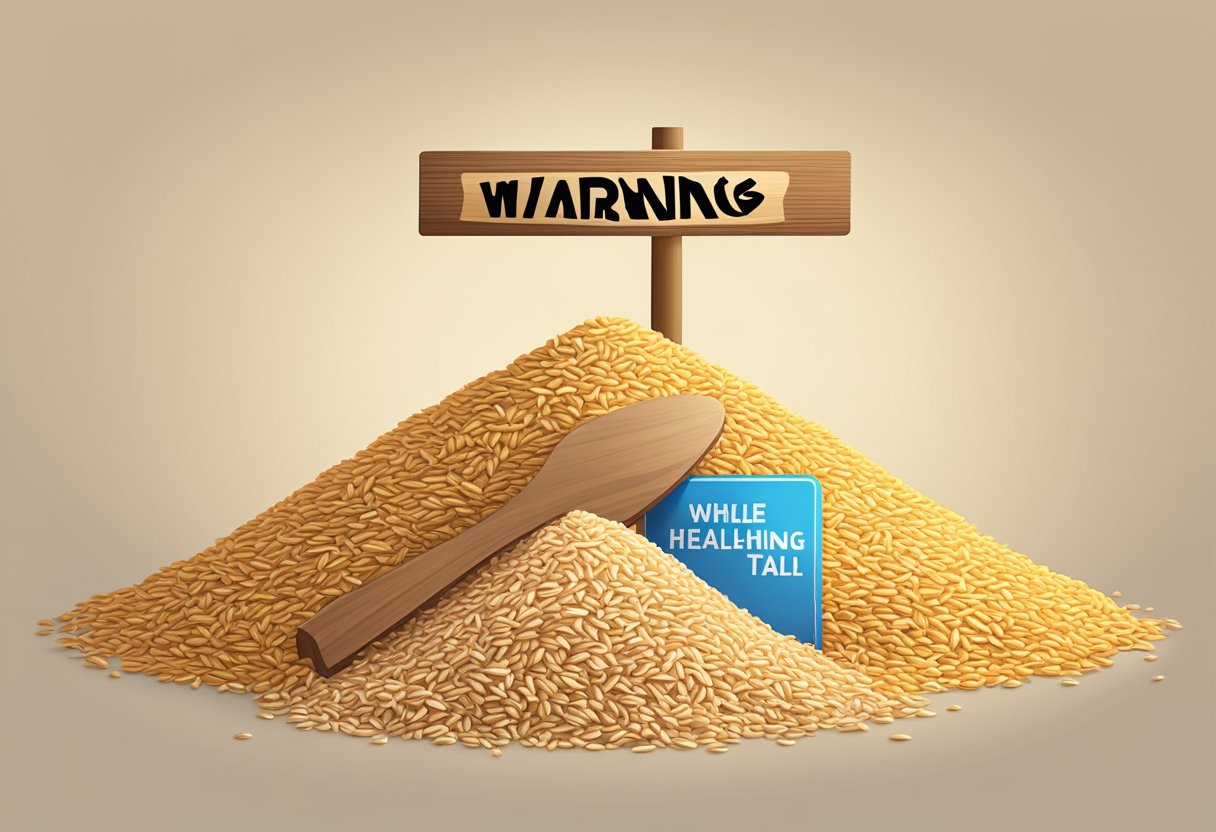Refined grains have become a staple in many diets across the globe, often chosen for their longer shelf life and the finer texture they lend to foods. However, these grains have undergone processing that strips them of the bran and germ, resulting in a loss of natural nutrients. Foods made from refined grains, such as white bread and white rice, offer less nutritional value compared to their whole grain counterparts, and consuming them can lead to rapid spikes in blood sugar levels.

The consumption of refined grains has been associated with various health problems. Studies suggest a link between a diet high in refined grains and a higher risk of heart disease, obesity, and type 2 diabetes. Conversely, whole grains retain all components of the grain kernel and provide a richer source of dietary fiber, vitamins, and minerals. Incorporating whole grains into a diet can contribute to better health and aid in maintaining a balanced, gluten-free Mediterranean diet, which focuses on nutritious and whole-food options.
Key Takeaways
- Refined grains lack essential nutrients due to processing.
- Consuming refined grains is linked to health risks like heart disease and diabetes.
- Opting for whole grains supports a nutritious gluten-free Mediterranean diet.
Table of Contents
Understanding Refined Grains
To make informed dietary choices, it’s essential to understand what refined grains are and how they differ from their whole grain counterparts. This section sheds light on the definition, types, and the refining process that transforms whole grains into refined grains.
Definition and Types of Refined Grains
Refined grains have undergone processing to improve their texture and extend their shelf life, but this comes at the cost of nutritional value. Common examples of refined grains include:
- White rice: The whole grain form of rice, with only the husk removed.
- White bread: Often made from wheat flour, where the grain is stripped of the bran and germ.
- Wheat flour: A prevalent type of flour used in baking, which is typically devoid of the grain’s nutritious components after refining.
These grains once contained all parts of the grain kernel — the bran, germ, and endosperm. However, refining removes the bran and germ, leaving mostly the starchy endosperm.
Refining Process: Bran, Germ, and Endosperm
The refining process involves separating and removing the outer layer, called the bran, and the nutrient-rich inner part, known as the germ. This leaves the endosperm, which provides energy but lacks the vitamins, minerals, and fibers found in the other two components. Here’s a brief breakdown:
- Bran: The outer skin of the grain that is rich in nutrients and fiber.
- Germ: The embryo of the grain with a concentration of vitamins and minerals.
- Endosperm: The largest part of the grain, primarily composed of starch.
In a gluten-free Mediterranean diet, the focus is on whole grains and minimizing refined grains like white rice and white bread, as these are stripped of the bran and germ during the refining process, causing a significant reduction in dietary fiber and micronutrients. Choosing whole grains instead contributes to a balanced and heart-healthy diet.
Nutritional Differences Between Whole and Refined Grains
Choosing between whole and refined grains can significantly affect one’s daily nutritional intake, particularly within a gluten-free Mediterranean diet, which emphasizes the importance of whole foods.
Comparing Nutrient Contents
Whole grains are comprised of three key components: the bran, the germ, and the endosperm. Each part contains essential nutrients that contribute to a balanced diet. They are rich sources of:
- Fiber: Aids in digestion and can help maintain blood sugar levels.
- Vitamins: B vitamins, including niacin, thiamine, and folate, which support various bodily functions.
- Minerals: Such as iron and magnesium, crucial for energy production and bone health.
In contrast, refined grains have had the bran and germ removed during processing, which strips away much of the:
- Fiber: Significantly lower in refined grains, leading to reduced satiety and potential negative impacts on gut health.
- Vitamins and Minerals: Loss of B vitamins, iron, and magnesium; some grains are later enriched, but not to their original levels.
This table summarizes the nutrient differences:
| Nutrient | Whole Grains | Refined Grains |
|---|---|---|
| Fiber | High | Low |
| B Vitamins | Preserved | Reduced/Added back |
| Iron | Natural levels | Reduced/Added back |
| Magnesium | Naturally present | Significantly reduced |
Impact of Losing Fiber and Essential Nutrients
The removal of fiber and essential nutrients from grains can have materials effects on health, particularly for those following a gluten-free Mediterranean diet. The missing fiber in refined grains results in:
- A higher glycemic index, which can cause spikes in blood sugar levels.
- Reduced heart health benefits that are typically associated with high-fiber diets.
Losing essential nutrients such as B vitamins, iron, and magnesium could lead to:
- Decreased energy levels, as these nutrients are pivotal in energy metabolism.
- Poorer overall nutrition, as refined grains contribute to energy intake without providing necessary vitamins and minerals.
By keeping the grain intact, whole grains offer a more nutritious profile that aligns with the nutrient-rich approach of a Mediterranean diet.
Health Implications of Refined Grains Consumption
The consumption of refined grains has been linked to various health issues, particularly related to metabolism and chronic diseases. These grains often lack essential nutrients found in their whole grain counterparts, influencing various aspects of health.
Link to Obesity and Type 2 Diabetes
Refined grains have a high glycemic index and can rapidly increase blood sugar levels. Frequent consumption can lead to insulin resistance, a hallmark of type 2 diabetes. Studies suggest a strong correlation between refined grain intake and the risk of obesity and type 2 diabetes.
Associations with Heart Disease and Stroke
Frequent consumption of refined grains may be associated with an increased risk of cardiovascular disease, though some research shows no direct connection with heart disease or stroke. It is essential to consider the type and quantity of refined grains consumed in correlation with heart disease and stroke risk.
Influence on Metabolism and Blood Sugar Levels
Refined grains can disrupt normal metabolism due to the removal of fiber and nutrients during processing. These grains often cause a spike in blood sugar levels, followed by a rapid decline, which can affect overall metabolism and blood sugar control.
Refined Grains and Chronic Diseases
Excessive consumption of refined grains may contribute to an elevated risk of certain chronic diseases beyond obesity and diabetes. Some research suggests a link with various chronic conditions, but more studies are needed to fully understand the relationship with chronic disease incidence.
The Role of Refined Grains in Diet and Nutrition

Refined grains play a controversial role in nutrition—while they are a staple in many diets, they lack the fiber and nutrients found in whole grains. It’s important to understand their place within dietary guidelines and how they fit into a balanced diet.
Place in Dietary Recommendations
The American Heart Association recommends an emphasis on whole grains over refined grains. Dietary guidelines often suggest that refined grains should be limited because the refining process strips away important nutrients such as dietary fiber and essential B vitamins. Additionally, most refined grains are devoid of the antioxidants found in their whole grain counterparts.
Balancing Grains in a Healthy Eating Pattern
In a healthy eating pattern, it is crucial to balance one’s intake of grains. Grains should not be entirely excluded but chosen wisely. Whole grains should be prioritized, providing more nutritional value, including dietary fiber which supports digestive health and may help in the management of weight. They also contain complex carbohydrates which provide the body with a more stable source of energy. However, for individuals following a gluten-free diet, such as those with celiac disease or non-celiac gluten sensitivity, the focus should be on gluten-free whole grains like quinoa, brown rice, and buckwheat. The Mediterranean diet, which is often touted for its nutritional benefits, can be adjusted to be gluten-free and highlights the importance of choosing nutrient-dense foods over calorie-dense refined grains.
Labeling and Identifying Refined Grains
Navigating the world of grain products requires a discerning eye, notably when it comes to identifying refined grains on food labels and ingredient lists.
Understanding Food Labels and Ingredient Lists
Reading food labels is critical for those following a gluten-free Mediterranean diet, where whole grains are preferred, and refined grains are limited. Ingredient lists provide valuable insight into the content of grain products. When assessing for refined grains, one should look for keywords such as “refined flour” or “enriched” flour. These terms indicate that the grain has been processed and stripped of the bran and germ, which are the nutrient-dense components of the whole grain.
In a gluten-free Mediterranean diet, recognizing gluten-containing refined grains is essential. Common refined grains include wheat-based products such as “white flour” or “all-purpose flour.” The gluten-free alternative should not contain these ingredients, and one should look for labeling that specifies “gluten-free.”
Whole grains are inherently gluten-free, like quinoa, rice, and buckwheat; however, they can be contaminated during processing. It is crucial, therefore, to search for “certified gluten-free” labels to ensure the absence of cross-contamination. When “whole wheat” appears on labels, it indicates the presence of the entire wheat kernel, which is not suitable for a gluten-free diet. On the other hand, “graham flour” is a type of whole wheat flour and should also be avoided by those requiring gluten-free options.
Labels can also tout “multigrain” or “made with whole grains,” which do not necessarily mean the product is free of refined grains. The position of ingredients on the list is indicative of their proportion in the product, with the first listed being the most prominent. A true gluten-free whole grain product will start its ingredient list with the whole grain named specifically, such as “whole grain brown rice” or “whole grain millet.”
For those managing their diet closely, awareness and understanding of food labeling and ingredient lists are indispensable tools in selecting the healthiest and most appropriate grain options.
Alternatives to Refined Grains
Seeking out whole grains and incorporating them into one’s diet is a key strategy in transitioning away from refined grains. These nutrient-dense alternatives not only offer a plethora of health benefits but also adhere to a gluten-free Mediterranean diet approach.
Incorporating Whole Grains Into Your Diet
Individuals have a variety of options when choosing whole grains. Brown rice and quinoa, for instance, are versatile alternatives that serve as excellent bases for a variety of dishes. Brown rice is a whole-grain version of the commonly used white rice and maintains the nutrient-containing bran and germ layers. Similarly, quinoa is a gluten-free seed rich in protein and can be used in salads or as a rice substitute.
Options like oats, buckwheat, and sorghum are also beneficial. Oats, commonly consumed as oatmeal, are a staple in a gluten-free Mediterranean diet, although one must ensure they are labeled as gluten-free to avoid cross-contamination. Buckwheat is not a type of wheat but rather a related to rhubarb, and it can be a great addition to pancakes or noodles. Sorghum flour can be used in gluten-free baking or popped like popcorn for a healthy snack.
Other whole grains include millet, rye, amaranth, spelt, wild rice, and barley. However, it’s crucial to note that while spelt and rye are whole grains, they are not gluten-free and should be avoided by those with gluten sensitivities.
Recipes and Preparation Tips for Whole Grains
Embracing whole grains means exploring new recipes and preparation methods. Whole-grain breads and pastas made from brown rice or quinoa offer a gluten-free solution for traditional wheat-based products. When making bread, one can mix flours such as brown rice and sorghum with healthy fats like olive oil to stay within a Mediterranean diet.
For cereals, choosing options that list a whole grain as the first ingredient and are devoid of added sugars align with both health and dietary considerations. Oatmeal can be flavored with fruits and nuts rather than sugar, enhancing both taste and nutritional value.
Here are simple ways to prepare whole grains:
- Brown rice: Simmer in water with a pinch of salt until fluffy.
- Quinoa: Rinse thoroughly, then cook similarly to rice.
- Buckwheat: Toast lightly before boiling to bring out a nutty flavor.
- Oats: Soak overnight or cook with milk or water for a warm breakfast.
- Barley: Excellent in soups and stews, but be sure to soak for several hours or overnight to reduce cooking time.
For more information on choosing whole grain products, one can refer to the guidelines provided by the Harvard T.H. Chan School of Public Health.
Refined Grains in Special Diets
Individuals with specific dietary needs, such as those following a gluten-free Mediterranean diet or those managing carbohydrate intake for weight loss, must consider the effects of refined grains on their health goals.
Gluten-Free Options and Considerations
Those with gluten sensitivity or celiac disease often turn to refined grains when selecting gluten-free products. However, one must be cautious, as many gluten-free options replace wheat with refined grains that lack nutritional value. For a healthier gluten-free Mediterranean diet, it is crucial to choose products that incorporate whole grains, such as quinoa and brown rice, which retain essential nutrients.
Managing Carbs for Weight Loss and Health
For people aiming to lose weight, refined grains can be a counterproductive choice due to their high glycemic index and low fiber content. Reducing refined grains and focusing on complex carbohydrates found in whole grains can support weight loss and improve overall health. They provide a sustained energy release, which helps in managing appetite and can be a strategic part of a Mediterranean diet that emphasizes good fats and lean proteins.
Scientific Perspectives on Refined Grains
The consumption of refined grains has been scrutinized in scientific literature, with a spotlight on their potential impact on health and their role in dietary recommendations.
Recent Studies and Clinical Findings
Recent clinical findings indicate that high consumption of refined grains might not be as detrimental as once thought if consumed in moderation. A significant study outlined in the Journal of Clin Nutr highlighted that consuming up to 6-7 servings per day of refined grains did not show a higher risk of coronary heart disease (CHD), type 2 diabetes (T2D), hypertension, or all-cause mortality. These results suggest that refined grains can have a place in a balanced diet, provided they are consumed within recommended servings.
On the other hand, it’s important to note that total grain intake, particularly when including whole grains, has been associated with a lower risk of all-cause mortality, implying that despite the neutrality of refined grains in moderate amounts, whole grains might provide superior health benefits.
Expert Opinions and Dietary Guidelines
Experts in nutrition, including those from the American Heart Association (AHA), typically advocate for the consumption of whole grains over refined grains. This is based on the understanding that whole grains contain more fiber, essential nutrients, and antioxidants.
The AHA specifically underscores the benefits of whole grains as part of a heart-healthy diet, contributing to the reduction of the risk of cardiovascular disease. Conversely, while refined grains are not outright condemned, they are recommended in much lower quantities than whole grains.
Experts also recommend fitting refined grains into dietary patterns that focus on overall health, such as a Mediterranean diet, albeit in a gluten-free variant for those with gluten sensitivities or celiac disease, ensuring that all individuals can adhere to a diet that supports cardiovascular health while managing their specific dietary needs.
Frequently Asked Questions
Refined grains are altered from their natural state, affecting their nutritional value. This section answers common questions about the health implications and identification of refined grain products.
What health risks are associated with consuming refined grains?
Consuming refined grains may lead to an increased risk of heart disease, obesity, and type 2 diabetes due to the loss of fiber and essential nutrients during processing, as detailed by the American Heart Association.
Which specific grains are considered refined and should be minimized in a healthy diet?
Typical refined grains include white rice, white flour, and white bread. People aiming for a healthy diet are often advised to choose their grain products carefully and focus on whole-grain alternatives.
How do refined grains differ nutritionally from whole grains?
Refined grains lack the bran and germ which results in a decrease in dietary fiber, vitamins, and minerals. Whole grains, on the other hand, maintain their nutritional integrity by retaining these components. For a more detailed comparison, refer to an article from EatingWell.
What are the common food products that contain high amounts of refined grains?
Products with high amounts of refined grains include pastries, cakes, white bread, and some breakfast cereals. These products often lead to quick energy spikes followed by a crash, making them less ideal for sustained energy throughout the day.
Can you list grains that are recommended to avoid for weight management purposes?
Refined grains such as white rice, pasta made from white flour, and white bread are implicated in weight gain and should be minimized in a diet geared towards weight management.
What are the potential negative effects of high refined grain intake on overall health?
High intake of refined grains can negatively impact overall health by contributing to metabolic syndromes, fostering inflammation, and upsetting the balance of gut flora. These effects are linked to various chronic diseases. Research findings on this topic are accessible through PMC articles.



